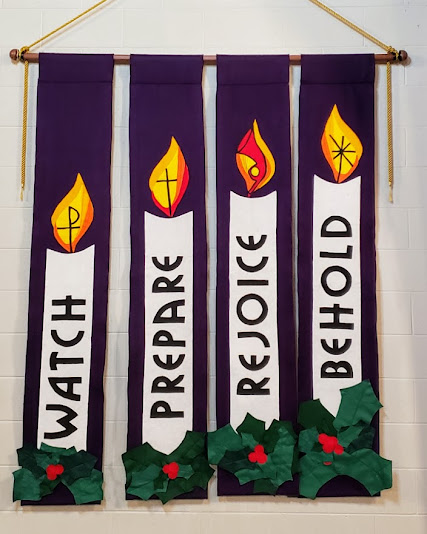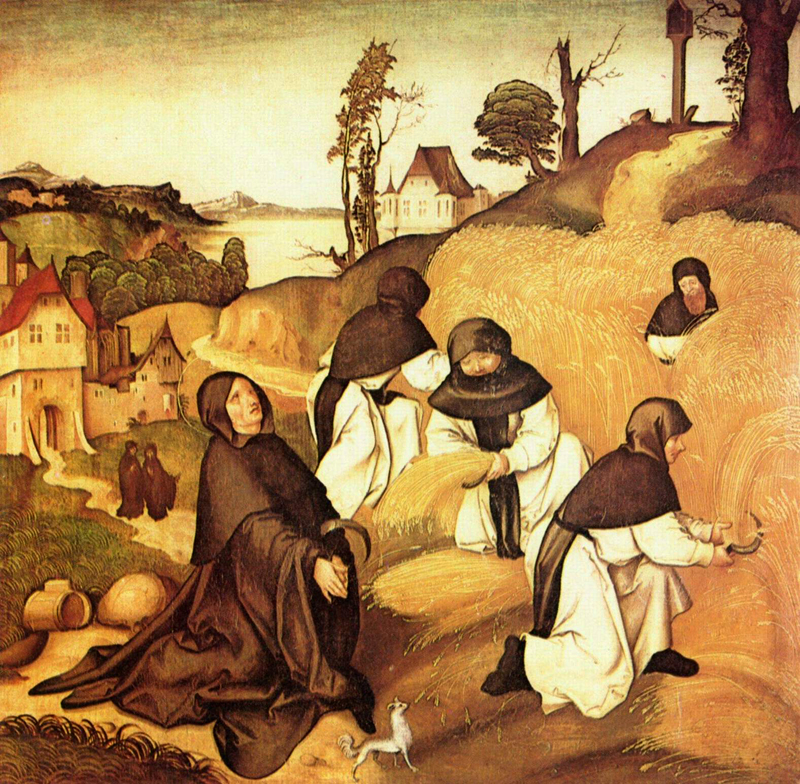Philippians 4:4-7 (8-9) New Revised Standard Version
4 Rejoice in the Lord always. I will say it again: Rejoice! 5 Let your gentleness be evident to all. The Lord is near. 6 Do not be anxious about anything, but in every situation, by prayer and petition, with thanksgiving, present your requests to God. 7 And the peace of God, which transcends all understanding, will guard your hearts and your minds in Christ Jesus.
8 Finally, brothers and sisters, whatever is true, whatever is noble, whatever is right, whatever is pure, whatever is lovely, whatever is admirable—if anything is excellent or praiseworthy—think about such things. 9 Whatever you have learned or received or heard from me, or seen in me—put it into practice. And the God of peace will be with you.
********
The four Sundays of Advent are driven by four themes—hope, peace, joy, and love. We light candles to highlight each of these four themes. The candles might be blue or purple, depending on the color scheme we choose. On the third Sunday, this Sunday, however, we light a pink candle. Why do we light a pink candle on this particular Sunday? What does pink have to do with the day we light the candle of joy? Well, here’s the reason. The purple (or blue) is seen as a more somber color that signifies repentance, which is part of the path of preparation for welcoming the birth of the Christ child. The choice of pink here softens the image as a way of acknowledging that joy is breaking through the more somber days of Advent. Since we light the candle of joy, what better scripture text to hear on a day like this than the passage from Philippians 4.
Whatever is happening around us, Paul calls for us to “rejoice in the Lord, always.” Yes, rejoice always, not just when we feel in a happy mood. Indeed, joy is not the same as happiness. Remember that Paul writes this letter not from a beach in Hawaii, but a jail cell in some undisclosed location. When Paul writes here about joy, he’s not suggesting that joy depends on our circumstances in life. Joy is rooted in relationships with God and with the community of followers of Jesus.
While Paul seems to have a deep and abiding friendship with the people in Philippi, which is the cause of his joy, it’s not as if this is a perfect congregation without problems or concerns. It might not be the Corinthian or Galatian congregations, but it’s not a perfect place (as if such a thing exists). Consider the word given to the congregation to encourage his former co-workers, Euodia and Syntyche, to get along. That will occur if they are of one mind in the Lord. The reason he wants to encourage the healing of the relationship is that these two women have been important partners in his ministry (Phil. 4:2-3). How often in churches do we find key members, who have had an important ministry, get cross-ways undermining their message. Thus, Paul wants them to reconcile so they can focus their attention on the ministry of the congregation.
Ultimately it is because the Lord is near that he has reason to be joyful. While that word has eschatological implications, it could also speak to Paul’s sense that God is present with him by the Spirit. This relationship with God, therefore, makes it possible to rejoice always. In fact, he tells the Philippians in this paragraph of the letter not to be anxious about anything. That’s, of course, easier to say than to do. Many of us live anxiety-filled lives. We worry about our health, the health of our family members, the situation in our nation and our communities. There is so much stuff going on in our lives that it’s difficult not to feel a bit anxious. You’d have to be a Vulcan not to feel anxiety in this day and age. So, how can Paul say to us don’t worry, be happy? Well, he doesn’t say that exactly. He simply says, don’t be anxious. Instead, pray. Again, it’s important to remember that Paul is writing this letter from a jail cell, so we can’t really dismiss this word as little more than pious claptrap. He knows what it means to live his life amid difficult circumstances. Nevertheless, he believes it’s possible for those who are people of God to experience joy, no matter the circumstances. That suggests that joy is something that is rooted in God’s presence in our lives.
I’m going to pick up on a word here that can be read in different ways. Paul writes to them, noting that “the Lord is near.” That can be read apocalyptically. We can think here in terms of Paul’s expectation that Jesus’ return in glory was near at hand. That is a message we find throughout Paul’s letters. He’s not, necessarily, a millennialist. That is, he doesn’t have a position on whether Jesus will return at some point to reign on earth for a thousand years (Rev. 20:4-6). That’s not part of his message. He does, however, believe that the last day, the day of the Lord, was near at hand. So, we can read it in this way. For our purposes, however, I’d like to read it in a more spiritual manner, in a way that someone like Origen or maybe St. Augustine would appreciate.
If we read it in a more spiritual manner, we can embrace the idea that no matter where we are or situation in life, the “Lord is near.” That is, we’re not alone as we take this journey of life. That is why we can live through difficult times without anxiety. It is the relationship that we experience with God, that sustains us, and brings us joy. It’s this relationship that is embodied by his connection with the congregation that sustains him. This suggests that the community is important to the life of faith.
People will ask whether one can be a Christian without being part of a church. Now there is a theology that suggests there is no salvation outside the church. The point of that message is a sacramental one. It is in the church that one receives the sacraments of baptism and the Lord’s Supper. I believe that these sacramental moments are important contributors to the Christian life and that they are made available in the context of the church, but that’s not what I have in mind here. It is the relationship that exists when we are in community that provides a space where God draws near to us. As Jesus said, “when two or three are gathered in my name, I am there among them” (Matt 18:20). This is the key to our ability to live lives of joy.
Now, the reading designated by the Revised Common Lectionary for the third Sunday of Advent is centered on verses 4-7 of Philippians 4. I’ve chosen to include in this reflection verses eight and nine. They seem to belong to what Paul writes in verses 4-7. These verses help focus our attention on what it means to live a joy-filled life. The key here is keeping our minds focused on the right things. That is, things that are noble and pure, lovely and admirable. Yes, keep your minds focused on praise-worthy things. When we keep focused on the things of God then the peace of God, which surpasses all understanding can guard our hearts and mind. That comes through Christ Jesus.
Since the Advent season has an eschatological dimension, we should keep our eyes on that word about Christ drawing near. That word reminds us that the day of the Lord is out there ahead of us. But there is no need to fear if one keeps one’s eyes on the prize. And, as we see here in this letter, Paul is committed to making sure this congregation is ready for that day. This message fits well with the message we find in the reading for today from the Gospel of Luke. In the reading from Luke 3, John the Baptist preaches a message of repentance and offers a baptism that will prepare the people to receive the coming Messiah. John is not the Messiah. He is only the one who prepares the way (Luke 3:7-18). Paul is not the Messiah, but he also is called upon by God to prepare the way for others to encounter the peace of God that comes to us through Christ. The final word of this reading, which is found in verse 9, is simply a word of encouragement. “Keep on doing the things that you have learned and received and heard and seen in me, and the God of peace will be with you.” Follow the way of Jesus, which involves love overflowing so we might know what is best so that on the day of the Lord we’ll be ready with a harvest of righteousness (Phil. 1:9-11). Then, we will break out in joyful song, singing “Joy to the world, the Lord is Come! Let earth receive her King!; let every heart prepare him room, and heaven and nature sing!” Yes,”Joy to the world, the Savior reigns!”










